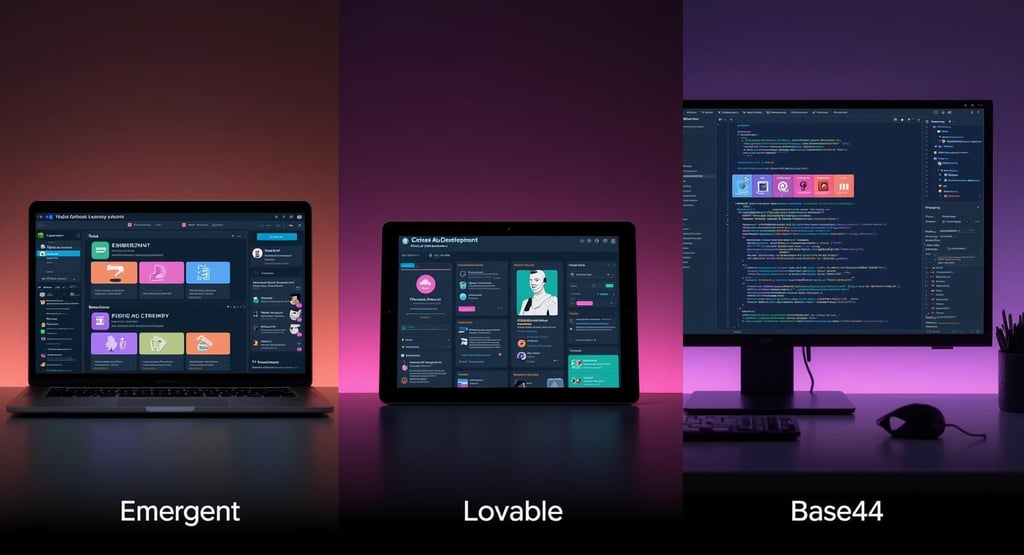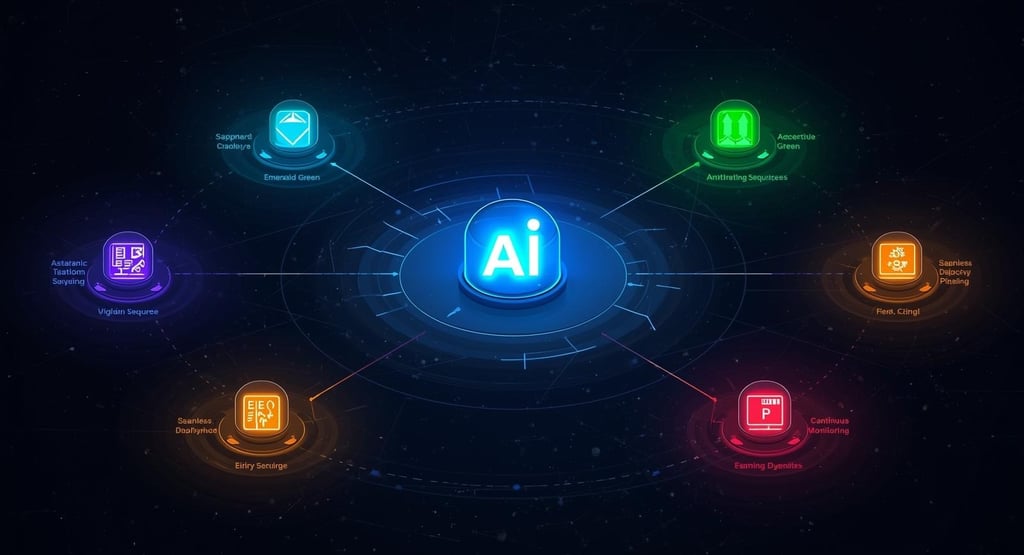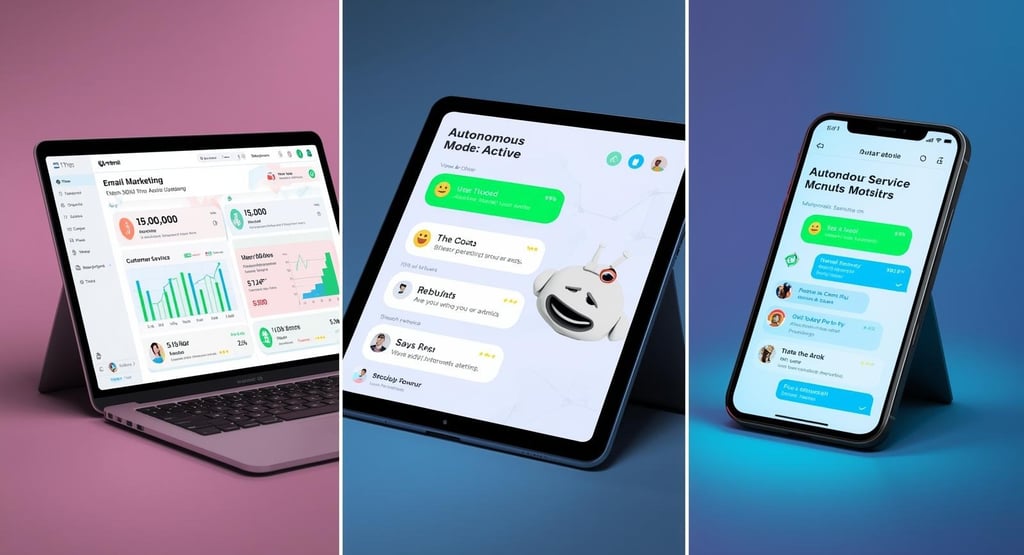Beyond Vibe Coding: Why Agentic AI Is the Next Billion-Dollar Opportunity for Non-Coders
Learn how agentic AI and autonomous AI agents are transforming app development for entrepreneurs. This complete guide shows you how to build profitable tools without coding skills using intelligent systems that handle everything automatically.
Eddy Enoma
10/20/202514 min read
How autonomous AI agents are creating the next billion-dollar opportunity for entrepreneurs
The response to our original guide on launching AI tools in hours proved something remarkable: we're living in the age of the citizen developer. Thousands of people who never wrote a line of code are now building and launching profitable AI applications using platforms like Emergent, Lovable, and Base44.
But here's what most people don't realize yet. While you're just getting comfortable with vibe coding, the technology has already evolved into something far more powerful. The next wave isn't about better prompts or smarter code generation. It's about something fundamentally different: Agentic AI, and it represents the next billion-dollar opportunity for non-coders who understand how to leverage autonomous development systems.
The agentic AI market is exploding from $7.06 billion in 2025 to a projected $93.20 billion by 2032, growing at a staggering 44.6% annually. This isn't just another tech trend. It's a complete reimagining of how software gets built, maintained, and scaled.
Understanding the Fundamental Shift: Vibe Coding vs Agentic AI
Think about how you've been building with vibe coding platforms. You craft a detailed prompt describing what you want, paste it into Lovable or another platform, and watch as it generates your application. It's impressive, sure. But you're still the project manager, the quality control team, and the maintenance crew all rolled into one.
Agentic AI changes everything about this dynamic.
Vibe coding is like hiring a brilliant contractor. You give them detailed instructions, they build exactly what you specified, but every change, every bug fix, every new feature requires you to come back with new instructions. You're in control, which sounds great until you realize you're also responsible for everything that follows.
Agentic AI is like hiring an entire autonomous development company that operates 24/7. You don't give it step-by-step instructions. You give it goals. "I need a resume optimization tool that generates $1,000 in monthly recurring revenue." Then you watch as multiple specialized AI agents spring into action, each handling their specific domain.
One agent focuses purely on writing clean, efficient code. Another agent is constantly testing for bugs and edge cases. A third agent handles deployment and server configuration. A fourth agent monitors security vulnerabilities. And here's the remarkable part: they communicate with each other, learn from their mistakes, and improve the application without you lifting a finger.
The implications are staggering. Gartner predicts that by 2026, developers outside formal IT departments will account for at least 80% of the user base for low-code development tools. We're not talking about a niche market anymore. We're talking about a fundamental restructuring of how software gets created in the modern economy.
The Market Numbers That Should Get Your Attention
Let's talk about the elephant in the room: money. Specifically, the absolutely massive amounts of money flowing into this space right now.
The AI agents market is projected to explode from $5.25 billion in 2024 to $52.62 billion by 2030, representing a compound annual growth rate of 46.3%. To put that in perspective, this market is doubling approximately every 18 months.
But the real story isn't just the total market size. It's who's building in this space and what they're creating. By 2026, around 75% of all new applications will be built using low-code technologies. Read that again. Three out of every four new applications won't be built by traditional developers writing code line by line. They'll be built by people like you, using platforms that abstract away the complexity.
The no-code and low-code market itself is on track to exceed $120 billion by 2030. That's not a typo. We're watching a hundred-billion-dollar industry emerge in real-time, and most people still think you need a computer science degree to participate.
Companies are already betting big on this future. Emergent recently raised $23 million specifically to build what they're calling "agentic vibe coding" platforms. Their vision? A world where the entire lifecycle of an application, from initial development through years of maintenance and feature additions, is handled by autonomous agents.
Why This Evolution Is Perfect for Non-Technical Entrepreneurs
Here's what makes this shift to agentic systems so powerful for non-coders: it doesn't make your existing skills obsolete. It amplifies them.
When you were learning vibe coding with platforms like Base44, you developed two critical abilities that most traditional developers lack: the ability to clearly articulate problems in plain language, and the skill to rapidly test and iterate on ideas without getting bogged down in technical details.
Agentic AI takes those abilities and supercharges them. Instead of spending your time managing technical implementation details, you focus entirely on the two things that actually determine success or failure: identifying the right problem to solve and getting your solution in front of the right people.
The competitive advantage in software development is shifting dramatically. Technical prowess used to be the gatekeeper. If you couldn't code, you couldn't build. That barrier is crumbling fast. What matters now is distribution and domain expertise.
Distribution means your ability to get users, grow an audience, and market effectively. Domain expertise means your deep understanding of a specific problem that needs solving. These are human skills that AI can't replicate. And they're exactly the skills that non-technical entrepreneurs often excel at.
Think about it this way: a developer might be able to build a beautiful scheduling tool, but if they've never worked in real estate, they won't understand the specific pain points that real estate agents face every day. You, with your industry knowledge and no coding experience, are now better positioned to build solutions than someone with a decade of programming experience.
The Hybrid Approach: How Smart Builders Are Winning Right Now
The entrepreneurs seeing the biggest success aren't choosing between vibe coding and agentic AI. They're using both strategically.
The winning formula looks like this: Start with vibe coding platforms like Emergent to rapidly prototype your initial concept. This gives you speed and flexibility. You can test your idea, get feedback from real users, and iterate quickly based on what you learn.
Once you've validated your concept and have actual users depending on your tool, that's when you transition to agentic AI systems for production-grade reliability. The autonomous agents take over the heavy lifting of maintenance, security updates, performance optimization, and feature enhancements.
This hybrid approach gives you the best of both worlds. You maintain the speed and creative freedom of vibe coding during the crucial early stages when you're still figuring out product-market fit. But you gain the reliability and scalability of agentic systems once you've found something that works.
Real entrepreneurs are already using this strategy to build portfolio businesses. They're spinning up multiple AI tools using vibe coding, seeing which ones gain traction, then migrating the winners to agentic platforms for long-term stability. It's like having a research and development team that costs almost nothing to operate.
The Five-Step Strategy Evolves: Adapting to the Agentic Era
Remember the original five-step process for launching AI tools? It's not outdated. It's more relevant than ever. But how you execute each step is evolving.
Step 1: Find What People Want remains unchanged. Use Google autocomplete, browse AI tool directories, lurk in industry-specific forums. The goal is still finding proven demand before you build anything. But now, with agentic platforms, you can afford to be more ambitious. You're not limited by what you personally have time to maintain.
Step 2: Generate Your Build Prompt is where things start getting interesting. Instead of just asking ChatGPT to create a prompt for Lovable, you're now defining high-level goals and success metrics. "Build a tool that helps freelance writers find clients, with a goal of 100 active users within 30 days." The agentic system takes that goal and figures out the technical implementation on its own.
Step 3: Build with Your Platform transforms from active development to strategic oversight. You're not tweaking prompts and adjusting parameters anymore. You're reviewing what the autonomous agents are building and making high-level decisions about features and priorities. The technical execution happens automatically.
Step 4: Deploy and Establish Presence becomes almost automatic. Agentic systems handle the deployment process, server configuration, security hardening, and performance optimization. Your job is securing the right domain name and setting up your brand identity. The technical infrastructure takes care of itself.
Step 5: Get Users and Generate Buzz is where you should be spending most of your time now. With the technical heavy lifting handled by autonomous agents, you can focus entirely on marketing, community building, and user acquisition. This is where non-technical entrepreneurs have a natural advantage. You understand people and problems better than algorithms do.
The Technical Details You Need to Understand (Without Getting Technical)
One question I hear constantly: "What exactly are these AI agents doing that's different from regular AI code generation?"
Here's the simplest way to understand it. When you use a traditional vibe coding platform, you're essentially giving instructions to a single AI that writes code. It's impressively smart, but it's still just one system doing one job.
Agentic AI deploys multiple specialized agents that work together like a real development team. One agent writes the initial code, but it's not working in isolation. Another agent is simultaneously reviewing that code for security vulnerabilities. A third agent is writing automated tests to ensure everything works as expected. A fourth agent is optimizing the database queries for performance.
These agents don't just work sequentially. They collaborate in real-time. If the security agent finds a vulnerability, it alerts the code-writing agent, which immediately addresses the issue. If the testing agent discovers a bug, it doesn't just report it to you. It works with the code agent to fix it automatically.
This is why platforms like Base44 are investing heavily in agentic features. They recognize that the future isn't about giving users better tools to write code. It's about removing the need to think about code at all.
The rise of autonomous AI agents is predicted to be the most impactful trend beyond 2026. We're moving toward a world where AI systems autonomously set goals, plan their own tasks, and execute decisions with minimal human intervention. For entrepreneurs, this means your role shifts from micromanaging technical details to defining vision and strategy.
Real-World Applications: What People Are Building Right Now
The abstract concepts are interesting, but let's talk about concrete examples of what's possible today.
Entrepreneurs are building SaaS tools that would have required teams of developers just two years ago. A solo founder recently launched an email marketing automation platform built entirely with agentic AI. The system handles over 10,000 users, processes millions of emails monthly, and the founder spends maybe five hours per week on it. The rest is automated.
Another builder created a customer service chatbot platform for small businesses. The agentic system handles everything from natural language processing to integration with dozens of third-party services. It automatically updates itself when those services change their APIs. It monitors its own performance and optimizes response times without human intervention.
These aren't hypothetical futures. These are real businesses generating real revenue today, built by people who couldn't write a function if their life depended on it.
The pattern is clear: the people winning right now are those who understand problems deeply and can articulate what success looks like. The actual technical implementation has become almost a commodity. 70% of all development activities will involve low-code platforms by 2025, and that number is only going up.
The Skills That Actually Matter Now
If technical coding skills are becoming less important, what should you be learning instead?
First, domain expertise has never been more valuable. Your deep understanding of a specific industry, its problems, and its customers is your competitive moat. AI can write code. It can't understand why real estate agents hate their current CRM or what keeps restaurant owners up at night.
Second, product thinking is crucial. This means understanding user needs, defining clear success metrics, and iterating based on feedback. When you're working with agentic platforms like Emergent, you're not telling the system how to build something. You're telling it what outcomes you want. That requires clear product vision.
Third, distribution skills are everything. The best AI tool in the world is worthless if nobody knows it exists. Learn how to write compelling copy, create engaging social media content, build email lists, and get coverage in the right places. These human skills are where you should invest your learning time.
Fourth, understanding enough about AI to have informed conversations is valuable. You don't need to understand transformer architectures or gradient descent. But you should grasp what AI can and can't do, how to evaluate different platforms, and how to think about AI-related opportunities and risks.
The Risks Nobody Talks About (And How to Avoid Them)
Let's address the elephant in the room: if building software becomes this easy, won't the market get completely saturated?
It's a legitimate concern, but history suggests otherwise. When WordPress made it easy to build websites, people predicted the web design industry would collapse. Instead, the number of websites exploded, and good designers became more valuable because they understood strategy and user experience, not just HTML.
The same pattern is playing out with AI tools. Yes, more people can build software now. But that just means more software gets built. The winners will be those who solve real problems well, market effectively, and provide genuine value. Technical barriers never prevented bad products from failing. They just made it harder for good ideas to get tested.
The real risk isn't market saturation. It's building things nobody wants because it's so easy to build. This is why Step 1 from the original guide, finding proven demand, becomes even more critical. The lower the barrier to building, the more important it is to validate before you invest time.
Another risk worth considering: over-reliance on any single platform. The smart move is building in a way that gives you optionality. Don't tie your entire business to one agentic AI platform. Understand how to migrate between systems if needed. Own your data, your user relationships, and your domain name.
Taking Action: Your Next Steps Into the Agentic Future
If you're feeling overwhelmed by all this information, here's the good news: you don't need to master everything at once. You just need to take the first step.
Start by building something simple using traditional vibe coding. Pick a problem you understand deeply, use a platform like Lovable to prototype a solution, and get it in front of real users. This teaches you the fundamentals of product development without the complexity of agentic systems.
As you gain confidence and your tool gains users, start exploring how agentic features can reduce your maintenance burden. Many platforms are rolling out agentic capabilities gradually. You don't need to rebuild everything from scratch. You can migrate features incrementally.
Focus obsessively on user feedback in these early stages. The technical implementation will improve automatically as platforms evolve. Your understanding of user needs is the one thing that won't improve without deliberate effort.
Join communities where other non-technical builders are sharing their experiences. The landscape is changing so rapidly that community knowledge is often more current than official documentation. Learn from people who are a few months ahead of you on the journey.
The Timeline: What to Expect in the Coming Years
Let's talk about realistic timelines for how this technology will evolve.
In the next 12 months, expect to see major platforms rolling out increasingly sophisticated agentic features. What currently requires multiple steps and manual oversight will become increasingly automated. The platforms that win will be those that make autonomous agents feel invisible. You'll define goals, and things will just work.
Within 24 months, we'll likely see the first wave of major success stories: non-technical founders building genuinely impressive software businesses entirely with agentic AI. These case studies will accelerate adoption dramatically. Nothing drives behavior change like seeing peers succeed.
By 36 months, agentic AI will probably be the default way new applications get built. Traditional coding will still exist for specialized use cases, but the majority of new software will come from people defining goals rather than writing code.
Gartner predicts 80% of low-code development users will be business technologists by 2026. We're not talking about a distant future. We're talking about fundamental changes happening within the next 18 months.
The Bottom Line: Why You Need to Act Now
Here's the uncomfortable truth: every day you wait, someone else is building the tool you've been thinking about. The barrier to entry has never been lower. The potential upside has never been higher. And the window of opportunity for early movers is right now.
The agentic AI revolution isn't coming. It's here. The global agentic AI market is projected to grow from $8.31 billion in 2025 to $154.84 billion by 2033. This represents one of the fastest-growing technology sectors in history.
But here's what the statistics don't capture: the human opportunity. For the first time in the history of computing, technical skill is not the limiting factor in building software. The limiting factors are now exclusively human: understanding problems, defining solutions, and reaching customers.
If you've been waiting for the right time to start building, this is it. If you've been intimidated by the technical complexity, that excuse is gone. If you've had ideas but didn't know how to execute them, the tools are finally here.
The question isn't whether agentic AI will transform how software gets built. That's already happening. The question is whether you'll be part of the transformation or watch from the sidelines.
Your job as an entrepreneur is no longer to write code. It's to direct the agents. And that's something anyone can learn to do.
Ready to Start Building with Agentic AI?
The platforms are ready. The market is massive. The timing is perfect. All that's missing is you taking action.
Start your journey with these leading platforms:
Emergent is pioneering agentic vibe coding with $23 million in funding specifically focused on autonomous development systems. Their platform is designed for builders who want maximum automation with minimal technical overhead.
Lovable offers the most intuitive interface for non-technical builders, with increasingly sophisticated agentic features rolling out regularly. Perfect for rapid prototyping and iteration.
Base44 provides streamlined AI app building with built-in monetization and business features, making it ideal for entrepreneurs focused on revenue from day one.
New to vibe coding and agentic AI? Start with the fundamentals. Read our step-by-step guide: How to Build and Launch AI Tools in Hours Without Coding Experience to master the five-step process, then return here to level up with agentic capabilities.
The citizen developer revolution is accelerating. The tools are more powerful every month. And the opportunities have never been more accessible. Your AI tool empire doesn't require a development team anymore. It just requires vision, determination, and the willingness to learn.
The future of software development isn't about who can write the best code. It's about who can define the best goals for autonomous agents to achieve. And that future starts today.
Want weekly insights on AI tools, no-code development, and digital entrepreneurship? Join thousands of builders getting actionable strategies delivered straight to their inbox. Subscribe below to stay ahead of the curve.
Subscribe for Exclusive Tips & Updates. Enter Your Email Below!



Get the latest strategies to create, automate, and monetize with AI, content, and digital marketing straight to your inbox!
🔒 We respect your privacy. Your email is safe with us. Unsubscribe anytime.
Address
Sporerweg 16
94234 Viechtach, Germany
Contacts Us
(049) 170 499 6273
Subscribe to our newsletter
© 2026 Onlinebizoffers. All rights reserved.
Privacy Policy | Terms & Conditions | Returns & Refunds Policy | Affiliate Disclosure


















